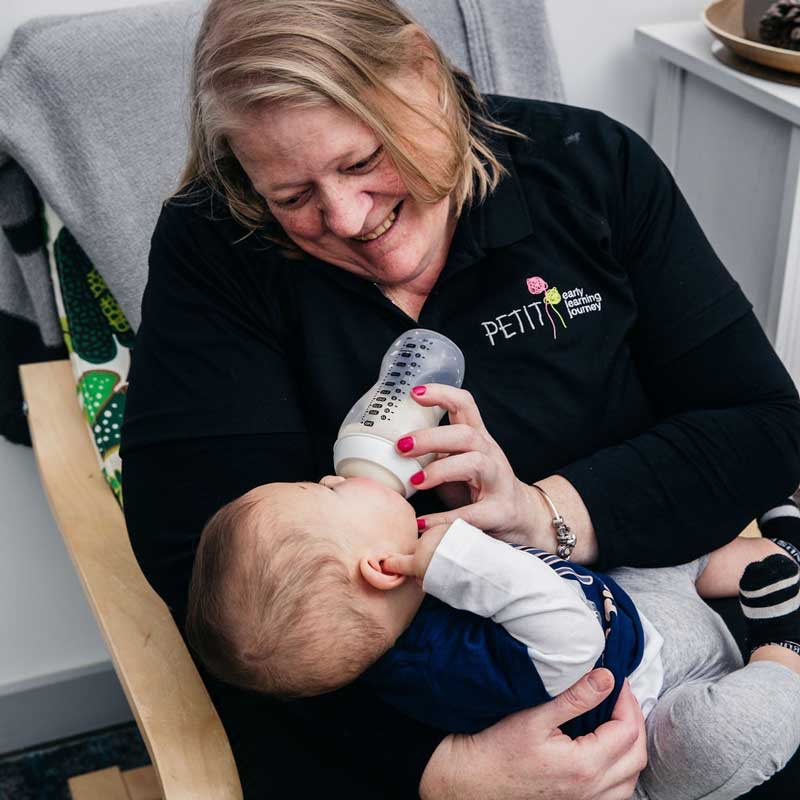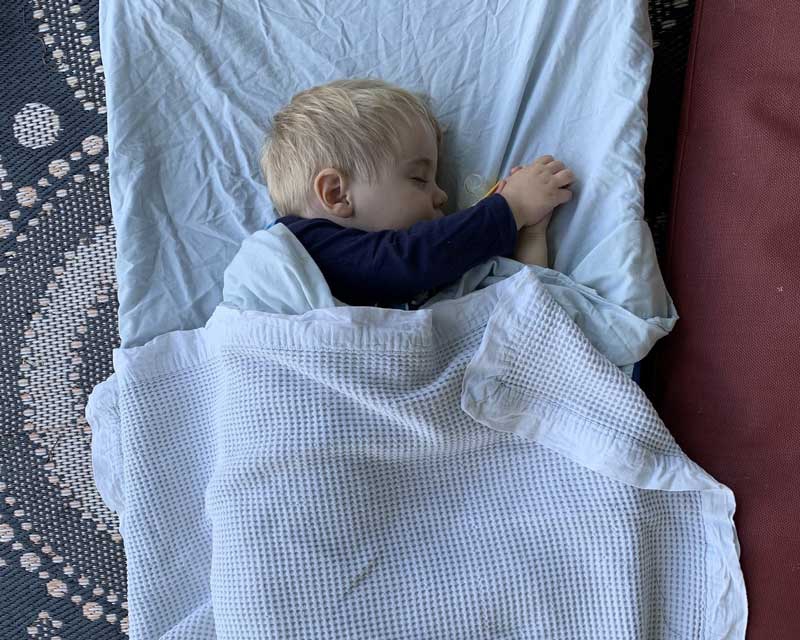Three Thing That Baby Cry Sound Baby Cry Sound
Babies brand lots of dissimilar noises, from giggles to grunts to infant babble. Most of the time, they're happily engrossed in their new world. However, when a demand arises, they take to let you lot know, and crying e'er gets your attention. Knowing baby crying sounds means you can soothe them more quickly.
New families can find it challenging to empathize what each crying audio means. You'll be relieved to know that babies really have their ain language and, interestingly, it'south the same no matter where your baby was born. It's a universal baby language and the expert news is that you can hands learn it.
The team at Petit Early Learning Journeying has enough of practice studying what each dissimilar sound signifies. And, we'd love to share our feel with you so that you tin empathise the different cries of your baby and their needs. Our inquiry covers:
- Why babies weep.
- Our top viii baby crying sounds.
- Mutual types of cries.
- A short review of the Dunstan Baby Linguistic communication especially newborn crying.
- How to at-home a baby.

Why practise babies cry?
The kickoff few weeks after the birth of a new baby tin be stressful for families equally they figure out why their newborn babies are crying. Infant crying sounds express different needs or emotions. While y'all might be a natural at great the code on some types of crying, most new parents do good from a flake of support.
Parents of babies need to look subsequently themselves during the starting time few weeks. When salubrious and at-home, you take more energy to nurture a meaningful relationship with your little one and nowadays a positive role model for your babe to learn from while responding to their different types of cries.
Here are some "crib" notes to assistance clue you lot into what your babe may be proverb (or screaming):

The tiptop eight reasons why your babe is crying
1. Your babe has a dirty nappy
Babies cry a lot in their first few months. There are many types of infant cries, but your baby will let you know when they have a moisture or total nappy. A moisture or dirty nappy is i of the top reasons babies are uncomfortable. No one wants to wear a total nappy for longer than they have to.
Listen for: A whiny, nasal, persistent weep with a short weep sound followed past a longer 1. As the sounds turn into intense crying, it is a signal that the infant has had enough. Check to see if they have a full or dirty nappy.
ii. Your baby is hungry
This type of cry relates to breastfed babies and canteen-fed babies. Information technology tin can accept a slow introductory phase where a infant is waking and realising they're hungry. At first, it might sound like fussy crying, only after a while, the cries get more than frantic to a point where they are louder, longer and more demanding.
Listen for: A type of cry that sounds like a siren. The sound is often accompanied by putting the hand to the mouth, clenching fingers and turning their head towards the bottle or breast.
3. You have a tired babe
Babies cry to communicate with their parents. For example, they may cry considering they're hungry, uncomfortable or tired. Cindy Davenport from Safe Sleep Space, a Petit ELJ partner and sector adept, advises families to "look, listen and think about what might be going on". Then, respond to a babe's cues.
During the outset few weeks, newborn babies rely primarily on their cry and reflexes to communicate. And so you might notice them yawning, closing their optics, making jerky movements, putting their fist to their mouth and sucking on their pollex. An older baby may rub their optics as they develop.
Listen for: High pitched crying baby sounds that have a lot of jiff behind them. They often begin every bit short soft whimpers that increase in intensity until the child's needs are met. This is a cry that your natural senses will tune into and learn.

four. You have a ill baby
This cry tin be tough for parents of babies and carers to hear, but information technology usually signifies that your lilliputian one is not feeling well. You should also consider other symptoms like whether your baby is lethargic, whether their optics are watery, or they accept a runny or blocked nose.
Take your child's temperature if yous're worried they have a fever. Telephone call your GP or state-based helpline if you are concerned about their health and wellbeing. If you suspect your baby has acid reflux (GER), tell your physician.
Listen for: Constant crying that doesn't cease even when the baby is fed, comforted or sleeping. Cries that bespeak signs of illness ofttimes audio like weak, tired moans. They are usually high pitched with low intensity. There may also exist long pauses betwixt crying sessions.
5. Your baby is uncomfortable
This blazon of cry tin can happen someday, especially with older babies who take more mobility. Put just, your babe is non where they want to exist. They might wriggle a lot in your arms, turn their head from one side to the other or attain towards where they want to go.
Listen for: A cry that is more than like a combination of all the cries put together. Information technology tin be persistent until the babe gets what they want. Sometimes they might want to be put down. Other times they may want to be picked up and held or cuddled by a unlike person.

More familiar types of babe cries
6. You accept an overstimulated baby
When there are besides many lights, new sounds or experiences happening all at one time, your baby can get overstimulated. Alter their environment. Shut the curtains, dim the lights, add some white noise like that from a fan or vacuum cleaner or heed to recorded nature sounds to help relax your baby.
Listen for: Intense ascent, falling and rising baby cries. This weep is similar to those heard when a baby suffers from current of air or gas pain. Your child may try to turn their caput or torso away from annoying lights or sounds.
7. You take a bored baby
Babies cry to limited their needs. Crying may be the only way that babies can communicate what they need. However, their crying may also be acquired past boredom. There are 2 schools of thought on boredom-induced newborn infant cries:
i) Baby'south seek attending by beingness fussy and restless. Crying gets someone's attention ("I cried, and they came!"). This oftentimes leads to a person holding the baby.
ii) Bored babies need to be entertained. This can lead to an overstimulated baby who starts crying once again.
We believe that when a child is encouraged to comprehend their marvel and explore their environment, they thrive.
Listen for: Oohs and ahs as the baby tries to get your attending. When they are unsuccessful, the cooing will alter to a fussy infant cry and and so build up an indignant cry that alternates with whimpers. Information technology has a similar crying pattern to the overstimulated baby.
viii. You accept a colicky infant
The reason behind babies with colic is nevertheless unknown. Colic refers to a infant's excessive crying and fussy behaviour. Information technology is not caused by whatever particular medical condition such as acrid reflux. Instead, colic is persistent crying that is difficult to soothe. It can start when a newborn baby is merely a few days former.
Non being able to condolement your baby can exist very stressful. Colic parents, families and carers need to expect after themselves. A GP may be able to make up one's mind if your infant'south persistent crying is acquired past a medical upshot. Still, for most colicky babies, at that place is no known cause for their behaviour.
Listen for: Long periods of crying with intense wails or screams where your baby is irritable, whingey and fidgety. Most babies naturally cry for ii-3 hours a day. However, a infant with colic will cry even more than, especially towards the late afternoon or evening.

Learning from the experts on infant crying sounds
In our studies, nosotros came across Priscilla Dunstan, an Australian opera singer who created Dunstan Babe Linguistic communication. She learned from newborns that the sounds a baby makes simply before they cry tin can help us determine what they are trying to communicate.
Dunstan conducted viii years of worldwide inquiry and discovered young babies of every race, colour and culture, make one of five sounds before they start crying. Romanian researches concluded her claims had an 89% accuracy. A different study by IOCScience written report concluded information technology was 94.seven% accurate.
Dunstan has shared her technique with audiences effectually the world, appearing on shows like Oprah and 60 Minutes. She has a huge fan base of operations of grateful parents and paediatrics and believes in supporting families to create a strong bond with their children.
Through observations, Dunstan discovered several basic sounds that a infant makes just before crying depending on their age. We've selected five vocal reflexes to review:
- Neh – hunger
- Eh – upper air current (burp)
- Eairh – lower wind (gas)
- Heh – discomfort (hot, cold, wet)
- Owh – sleepiness
Let's look a little deeper into how y'all tin interpret each of these different sounds. We'll besides share some of the other observations we've made here at Petit ELJ. These volition give yous some more clues to help you understand what your crying baby is trying to tell you.

Baby crying sounds in words
1. "Neh" – hunger
A newborn baby uses a sucking reflex to create the audio "neh" when they are hungry. The all-time mode to recognise this audio is to observe your baby'south mouth. They brainstorm practising this vocal reflex in the womb. If your babe is making sucking motions and crying, you volition hear the sound "neh" at the get-go.
Babies brand this audio when their tongue moves to a position behind their teeth, similar to where we create an "nnn" audio. As your baby opens their mouth, the natural language glides forwards in a sucking move. Combined with the air behind a cry, information technology makes the sound "neh". Information technology may sound similar to the give-and-take "cyberspace".
Our ascertainment: Most new babies clench their fists when they are hungry (a reflex known equally the palmer grasp). Babies may also attempt to gnaw or suck at their hand or reach towards your chest or a bottle. By observing your baby's response for hunger you tin answer to them earlier they go super hungry.
2. "Eh" – upper wind (burp)
The sound reflex "eh" means your newborn needs to be burped. This sound is acquired by internal reflexes pushing an air chimera from their chest. The baby naturally responds with a short hiss, a grunt, or a squeak the sounds similar "eh" in "egg". It'due south not a real burp merely the audio your infant makes when trying to burp.
Our observation: A pained facial expression, squirming, kicking, shaking and other fussiness are all indications that your baby needs to burp. You want to avoid an accumulation of air bubbles. It'due south a good idea even if they're not finished drinking, to burp them now and and so go along with their feed.
3. Eairh – lower air current (gas)
This audio is more than noticeable when a baby is 6-12 weeks of age. If a baby has flatulence or an upset breadbasket, you lot volition hear the sound reflex "eairh". If the sound is isolated from crying and so your baby may have general discomfort and astringent gas pain may non develop.
"Eairh" starts with an open up mouth, tongue held back and a taut abdomen. When the hurting is intense the start of the "eairh" audio is elongated into an intense cry. Dunstan describes it every bit a forceful loud cry that makes parents uncomfortable. It's acquired by cramping breadbasket muscles.
Our observation: If you miss the early sounds and your babe begins to cry, the crying will exist very loud, intense, and rhythmic. It will last until the air current has passed which may follow a like path every bit a bowel move. To ease their discomfort there are several different holds or y'all tin can give them a massage.
4. Heh – discomfort (hot, common cold, wet)
Babies make the sound reflex "heh" when they experience stress and discomfort such equally those signalling a nappy change. It's a audio associated with babies over 6 weeks of historic period. This audio is triggered as a response to a skin reflex, such as a sweaty or itchy feeling. "Heh" has a several vocal variations.
Our observation: When a baby feels discomfort, their crying is usually mild and intermittent. The crying increases in volume if you ignore it, so be sure you soothe your infant and apace determine the crusade of their discomfort. We recommend learning what all the different types of cries mean for "heh".
Our observation: When a baby feels discomfort, their crying is normally mild and intermittent. The crying increases in volume if you lot ignore it, so be sure yous soothe your infant and quickly make up one's mind the crusade of their discomfort. We recommend learning what all the different types of cries mean for "heh".
5. Owh – sleepiness
Newborn babies make the audio reflex "owh" when they are feeling tired. This audio is created as the baby yawns and exhales. "Owh" can exist heard before the babe cries and during newborn crying. Babies making this audio accept an oval shaped mouth, flattened tongue and spacious room inside the oral cavity.
Our observation: If it's time for a nap, your infant may outset rubbing their eyes. Their cry may start out slow and low and gradually build in tone and intensity. If your baby is exhausted their cry can resemble the hunger cry. Mind to the starting sound before the cry and you lot can tell the divergence.

How practice y'all calm a crying infant?
There are many reasons for a baby to cry, and our first priority should be to find out the cause and gear up information technology. If you listen to your baby's different sounds, y'all volition soon be able to decipher them. Babies take a variety of cries that tin can change depending on their surroundings and needs.
Yous don't need to comfort your babe every time they weep. However, understanding what your infant is telling you volition foster a strong bail and requite your little one a more profound sense of comfort. Hither are several ways to comfort a crying baby:
- Learn what the cries mean for your infant and how to soothe them.
- Find a comfy spot to nurture them if the sound they brand says, "I'm hungry!"
- Swaddle them in a cotton or muslin wrap if they're saying, "I'm tired," and help them sleep.
- Wipe their nose or employ a nasal aspirator if their crying says, "I'chiliad sick."
- Wearing apparel your baby for their surround. If their crying says, "I'thousand besides hot," or "I'chiliad too cold," look at how many layers you lot have on and apparel them accordingly.
- Change their full nappy if their crying says, "Hey, my nappy needs changing, over again."
- Give your babe a gentle warm bathroom.
- Offer a pacifier at about 3-iv weeks or longer if breastfeeding.
- Hold and pat them in your arms, skin against peel. Young babies frequently like to mind to your heartbeat as it's a familiar sound.
- Sing a soothing lullaby, put on some white noise or nature sounds.
It must be stressed that while these baby crying sounds are noticeable in many babies, every child is unique. For example, premature babies may have different sounds. In addition, some babies are born with medical conditions such every bit a tongue-tie which can alter the sounds a babe makes.
Our communication is to observe your baby closely, record the clues they requite and notation how they answer to the unlike means you comfort them.
As Priscilla Dunstan says, "Terminate. Open your ears. Listen. Your baby will love you for it."

Nurture your baby with Petit Early on Learning Journey
At Petit ELJ, we provide a safe, warm surround to permit your baby to grow and explore while feeling secure and loved. We class potent partnerships with families. Our Educators observe and reverberate in private journey portfolios as your baby learns and develops.
Our behavior value the part families have as a child's first educator. Nosotros invite you to learn more than virtually how we tin support you and make yous and your baby's life easier and happier. Detect how we can work together to help your baby blossom.
caringtonevia1960.blogspot.com
Source: https://www.petitjourney.com.au/understand-the-different-cries-of-your-baby/